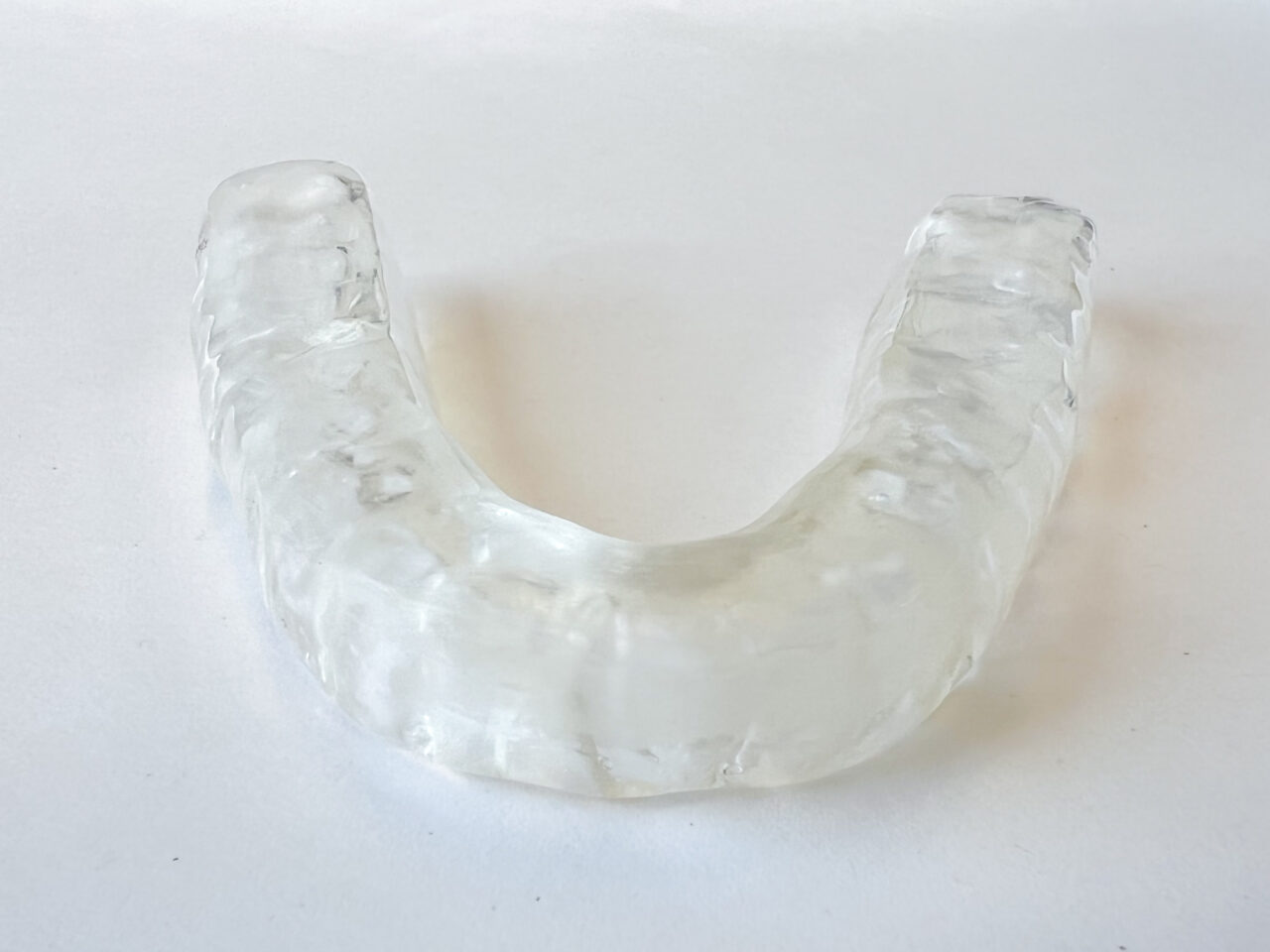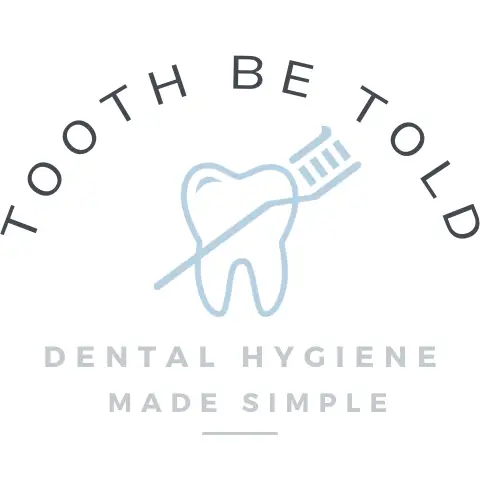As a dental hygienist, my top priority is guiding my patients to improve their oral health and protect the integrity of their teeth, gums, and jawbones. I often discuss using night guards to prevent damage to the teeth and gums with my patients. Usually, they ask me if using over-the-counter store-bought dental night guards is okay and if nightguards can damage teeth and affect their bite.
Ill-fitting and poor coverage (for example, night guards that only cover front teeth) can lead to over-eruption of teeth, tooth mobility, muscle tension, bite issues, potentially causing gum disease advancement, cavities, cracked, chipped and broken teeth, tooth loss, and speech problems.
Wearing a nightguard covering only the front teeth can cause an anterior open bite, as seen in the image above. The front teeth cannot come together because of the over-eruption of molars.
Also, over-the-counter night guards are not a perfect match for the teeth and are not checked by a licenced dental professional to ensure that the forces of clenching and grinding (bruxism) are being distributed equally.
In this post, I dive into why purchasing an over-the-counter dental night guard should be avoided, but when it cannot be avoided, I advise which dental night guards are okay to buy over-the-counter and will cause the least worry to us dental professionals if having one made professionally is not an option.
Ill-fitting and poor coverage nightguards can cause over-eruption of teeth and dental issues, costing over $5000 to fix
Ill-fitting and partial coverage nightguards should be avoided. I am so passionate about preventing people from using dental products that do not have adequate coverage or fit poorly because they can cause serious dental issues!
Damages caused by partial coverage or poorly fit can cost over $5000 USD to fix, and that is only if they can fix it, as some issues that can happen are irreversible!
Buying a cheap product that is poorly made will cost you way more than if you just had a nightguard professionally made at the dentist.
Let me explain;
Night guards that do not evenly cover every tooth can cause over-eruption of teeth
Teeth always want to come together when you bite.
If the night guard only covers the front teeth, a significant gap is left between the top and bottom back teeth! This opening will allow the top and bottom back teeth to start over-erupting, with the goal of touching together when biting.
This video presented by Michael Nugent DDS perfectly shows how teeth can over-erupt if they are not touching together! Like he says in the video, “teeth like to be social, and they like to have neighbours”… I love that!
perfectly shows how teeth can over-erupt if they are not touching together! Like he says in the video, “teeth like to be social, and they like to have neighbours”… I love that!
The video shows what happens if there are no opposing teeth, but the same happens if there is a large gap left between the teeth every night if you are wearing a night guard that does not cover the entire arch of teeth.
Over time, if the back teeth over-erupt too much, they will come closer together, preventing the front teeth from coming together. Over-erupting back teeth will start to create a gap between your front teeth.
And as the video above states, over-eruption can cause problems with gum tissue and increase gum disease and cavities.
This will not happen overnight, but with continuous wear, it can, and if it were me, I would want to know this risk before purchasing and wearing a nightagurd that does not fully cover all my teeth, or is not the right fit.
If this occurs, you may need orthodontic treatment and possibly oral surgery to fix the problem that an over-the-counter night guard caused.
Prices to fix/correct the damage inflicted can extend past $5,000! And sometimes, may not even be able to be done.
If you have any dental work on your front teeth, wearing this device will compromise that dental work.
Again, serious complications can come from over-the-counter night guards and nightguards made and designed by non-dental professionals.
If you have a nightguard or are curious, below, I linked to a post I wrote about how long dental nightguards last and what to watch out for that indicates you need a new one!
Read Now: How Long Do Dental Nightguards Last For? Hygienist Explains
A personal story;
I will be the first to admit that I didn’t take the advice of my dentist I had in my teenage years. He recommended that I get a night guard because there was evidence that I was clenching and grinding my teeth.
Because both the dentist nor the dental hygienist did not take the time to explain the importance of wearing a night guard or explain the consequences of not wearing it, I didn’t value the importance of getting one, and I did not want to shell out hundreds of dollars to get one.
Because of the lack of explanation, it cost me dearly. I have ground down my molars, so they are essentially flat, and I have both cracked and chipped my teeth.
In my first year of dental hygiene school, I realized the importance of wearing a night guard to prevent tooth damage and long-term issues.
That is why I am so passionate about explaining the importance of wearing a high-quality nightguard made by a dentist and the consequences of wearing one that is inadequate and can cause long-term damage.

Read Now: Perfect Bite: How Teeth Should Line up and Come Together
Scientific case report of inadequate coverage of night guard
This article from the British Dental Journal depicts a case study of a patient who had significant bite issues after wearing a night guard that didn’t have the proper coverage on all teeth.
depicts a case study of a patient who had significant bite issues after wearing a night guard that didn’t have the proper coverage on all teeth.
Her teeth did not touch equally on the night guard and the guard did not cover all of the teeth, resulting in over-eruption of teeth, causing an open bite, where the teeth could no longer bite fully together.
Any device (including a night guard) that will be used for a prolonged amount of time must cover all the biting surfaces, and when the teeth bite together, all teeth are touching and applying equal force.
“the selective over-eruption of posterior teeth not incorporated in the appliance can lead to the development of an anterior open bite.”
https://www.nature.com/articles/sj.bdj.2011.46
What is the best night guard for teeth grinding?
I have patients who sit in my dental chair and the dentist and I recommend a night guard, but they do not want to shell out the money for one because they do not see the value. My job is to educate them on the value of wearing one and preventing dental issues.
The best night guard for teeth grinding covers all occlusal surfaces, and when biting down with the opposite arch, all teeth come into contact with the night guard with equal pressure forces.
Why you should have a night guard professionally made by a dentist
Any product you put in your mouth should be vetted by a licenced dental professional.
You would want a heart surgeon, not a bank manager, to perform your heart surgery. People have medical licenses for a reason, to protect the public.
There is a reason why dental professionals make nightguards. Please do not take the cheaper route because not only can it be detrimental to your bite and your overall smile appearance, but it can also cause cracking, chips, dental abscesses, and so many other dental issues!
A properly made dental night guard should cover all the teeth, and when biting down, all opposing teeth touch the night guard. It is imperative to provide an even distribution of clenching and grinding forces.
A professionally made night guard at the dentist is the best option
Having a dentist make a night guard for you takes all steps to ensure you are getting a properly made dental appliance.
Moulds of the teeth are taken, or a scan of your teeth will propagate a digital 3D model of the teeth (that is how I got mine made).
These models, either physical or digital, are used to create an exact cast of your teeth on which the night guard will be made. This allows the night guard to be an extremely accurate match to your mouth and be firm in place when placed in the mouth.
When the night guard has been made, the dentist will bring you in for an appointment to try in your night guard. The dentist should check that all teeth hit the night guard at equal pressure. They may even use articulating paper (think graphite/carbon paper but safe for the mouth) to check the bite and make slight adjustments with a dental drill.
Read Now: How Dental Hygienists Clean Teeth! What You Need to Know!
They will also give you tailored advice depending on the material used to make the night guard, which is priceless! Maintaining the night guard will allow it to last for a long time.
But what if a professionally made night guard isn’t an option for somebody? Sometimes there are issues with access to care, and money is a factor.
The best over-the-counter night guard for teeth grinding
The best over-the-counter night guard for teeth grinding is one that will cover all the teeth on either the bottom or top arch and all opposing teeth touch when biting. It should be moldable to the teeth, providing a custom fit. Boil and bite are the best because they cover these criteria.
I have patients who cannot afford a professionally made night guard, and I get them to bring in their over-the-counter night guard at their hygiene appointments to check for defects or issues that may need to be brought up with the patient. I still want them to have the best they can get!
The over-the-counter night guard that I recommend to my patients can be found on Amazon. It is the DenTek Professional-Fit, Maximum Protection .
.
This night guard is FDA registered device, BPA free and made in the USA! It comes with a patented fitting tray, an antimicrobial storage case, and a moldable night guard.
No matter what night guard you are using, you must regularly see a dental professional and check it for defects that could lead to dental issues.
Some medical conditions like sleep apnea might also contraindicate the use of a night guard. Check with your doctor and dentist to discuss any medical conditions you have.
I hope this information finds you well and I have helped you find the information you were looking for!
Have a wonderful day,
Holly 🙂
